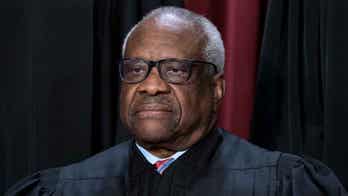As a handful of frustrated Senate Democrats attempts to change the way the Senate conducts a filibuster, it is becoming clearer that should they force such a change, they could snatch defeat from the jaws of victory in another area where they are seeking to make a major adjustment.
Right now, any one senator can anonymously block a nominee or piece of legislation by simply placing what's called a "hold" on the person or bill. Scores of nominees have been stymied over the years by both parties using this method, but it appears many members are ready to give up this prerogative.
Sen. Lamar Alexander, R-Tenn., a member of leadership, led the charge Wednesday against any alteration of the filibuster rules, but the former Education Secretary who, himself, was the victim of a secret hold by a Democratic senator from Ohio, said he would be happy to do away with the anonymity surrounding the practice.
"Secret holds... is an area that has had a lot of work and has bipartisan support," Alexander told his colleagues Wednesday.
Sen. Chuck Grassley, R-Ia., co-sponsor of a measure that would force members to publicly claim their blockade and not allow any senator to simply pass off the anonymous cloak to another member, challenged, "If a senator...has a legitimate reason to object to proceeding to a bill or nominee, then he or she ought to have the guts to do so publicly.... There is no legitimate reason for any senator to ever have to, if they place a hold, to have that hold be secret."
It's no easy task to end the practice, however. Grassley has worked with Sen. Ron Wyden, D-Oreg., for 15 years to try to bring holds out of the shadows. The two have been joined in the effort more recently by Sen. Claire McCaskill, D-Mo., who chastised senators Wednesday for not adhering to previous, sweeping changes in ethics laws that were supposed to end secret holds.
"People who voted for this, there were a bunch of them that didn't mean it," McCaskill scolded. "It was window dressing. They weren't sincere about ending secret holds, because we discovered when we started trying to use that language that some of the folks who voted for it were doing the old switcheroo. When they were called upon under the law to reveal their hold, they would just hand their hold off to someone else. "
Sen. John Cornyn, R-Tex., also in leadership, called the elimination of anonymity "somewhat attractive" and added, "I think if there ever was a time for (secret holds), that time is long past gone."
For his part, Sen. Pat Roberts, R-Kan., said he would go along with ending anonymous holds, but he also had a message for the White House. "We could stop this business of secret holds. It seems to me we could have a timely pace on nominations. It seems to me that we could certainly end these recess appointments where people who should be confirmed have to go through the confirmation process, instead of parachuting somebody in who is very controversial."
Roberts warned, however, that "the business of ending the filibuster or going down on the number of requisite votes (to end a filibuster), you're on a slippery slope. Then you're into the tyranny of the majority, and that's not what the Senate is all about."
It is unclear what is going to happen with the Democrats' efforts to blunt the effect the filibuster. Senate Majority Leader Harry Reid, D-Nev., who has decried GOP obstructionist tactics, has not endorsed any plan to limit or do away with the filibuster. The leader is currently trying to negotiate a compromise with his GOP counterpart, Mitch McConnell of Kentucky, who on Wednesday noted Democrats' historic record of refusing amendments from the minority on legislation.
But it seems that eliminating the cloak of secrecy from any effort to block bills or nominees is shaping up to be one area of common ground, though it could fast be destroyed by any move to hem in the filibuster.




